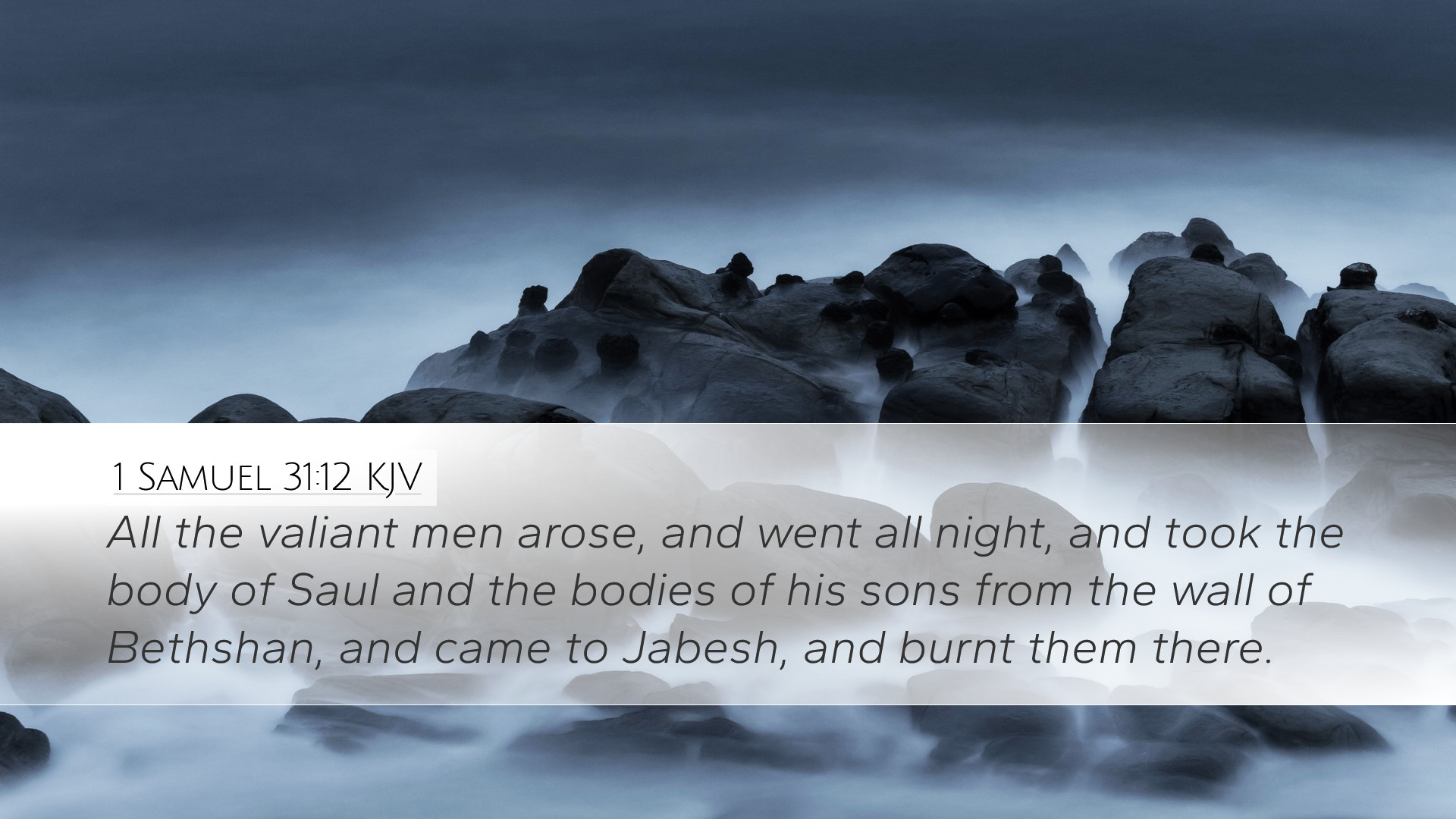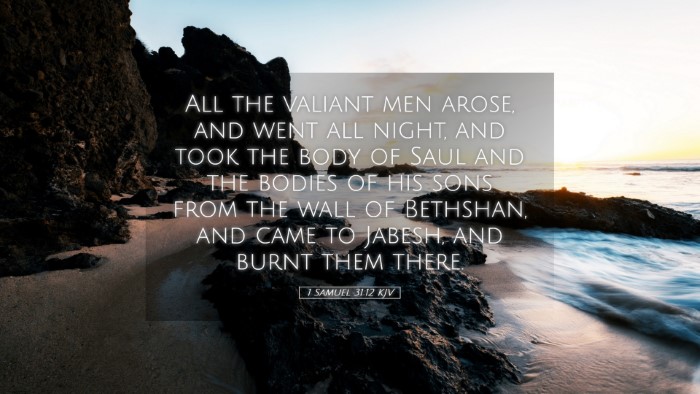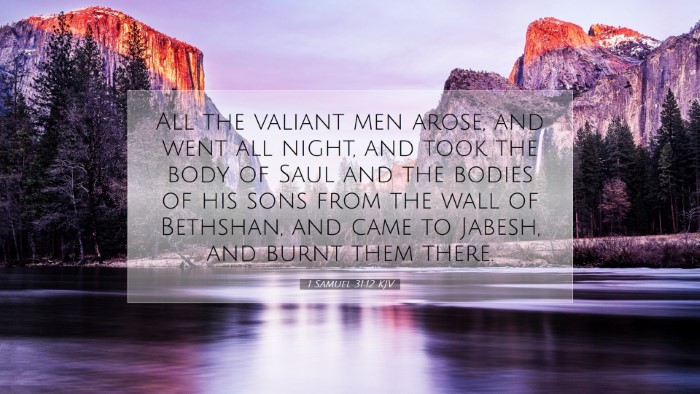Commentary on 1 Samuel 31:12
1 Samuel 31:12 states: "All the valiant men arose, and went all night, and took the body of Saul and the bodies of his sons from the wall of Bethshan, and came to Jabesh, and burned them there."
Contextual Overview
This verse captures a poignant moment in the history of Israel as it marks the end of King Saul's reign and life. The Philistines had defeated Israel on Mount Gilboa, and Saul, having been severely wounded, took his own life. His body was displayed publicly in Bethshan, signifying his defeat. The actions of the valiant men who retrieved his body are rich with implications for Israel's understanding of honor, loyalty, and the complexity of leadership.
Insights from Commentaries
Matthew Henry's Commentary
Matthew Henry emphasizes the theme of loyalty present in this narrative. He discusses how the valiant men of Jabesh-Gilead, recalling Saul’s earlier act of delivering their city from the Ammonites (1 Samuel 11), were moved by a sense of profound obligation and respect for their fallen king. Their willingness to risk their lives to recover Saul's body showcases a deep-seated honor towards his kingship, as well as a collective memory of past deliverance.
- Loyalty and Honor: Henry notes that the men’s action signifies the importance of remembering the good amidst the evil. They honored Saul's memory despite his failures later in life.
- Restoration of Dignity: The act of burning the bodies signified a form of burial that, although seemingly harsh, was a culturally accepted way of showing respect and also signified a finality regarding their fallen leaders.
- Symbolism of Action: The journey taken at night symbolizes a holy act; their clandestine efforts illustrate the weight of their mission and the societal need for reverence even in defeat.
Albert Barnes' Notes on the Bible
Albert Barnes elaborates on the strategic and practical aspects of the event. He interprets the retrieval of Saul’s body not only as a display of loyalty but also as a necessary act in preserving the dignity of Israel’s leadership amid perceived disgrace. The passage indicates a shift from national embarrassment back toward a sense of honor and respect for the past.
- National Pride: Barnes discusses how this act was a reclaiming of national pride. In the aftermath of defeat, these men took it upon themselves to restore honor to their leader and to Israel.
- Symbol of Unity: Collectively, the valiant men acted as a crucial reminder of unity in leadership. By coming together for Saul, they showcased that even in the face of loss, loyalty to the nation is paramount.
- Mixed Feelings: Barnes also reflects on the emotional complexity of the situation. The valiant men acted out of a mix of nostalgia for Saul’s previous victories and a sense of duty to their identity as Israelites.
Adam Clarke's Commentary
Adam Clarke offers a theological reflection on the significance of the actions of these valiant men. He underscores a theme of mortality, humility, and the cyclical nature of leadership. Clarke discusses the implications of death not simply as an end but as a transformative moment in the legacy of a leader.
- Human Mortality: Clarke asserts that Saul’s death serves as a sobering reminder of human fallibility and the ephemeral nature of power. This event becomes a cautionary tale about pride and disobedience.
- Legacy and Memory: Clarke posits that the way Saul was honored posthumously speaks volumes about how leaders are remembered. This retrieval of his body was a conscious choice that shaped the national narrative going forward.
- Impact on Future Leadership: The event sets a precedent for how Israel was to view leadership. While Saul’s life had been marred by failure, his death prompted a reckoning that would sculpt future expectations of kingship.
Theological Implications
The retrieval and dignified burning of Saul and his sons’ bodies reflect profound theological concepts. The act serves as a reminder that despite Saul's many shortcomings, the men from Jabesh-Gilead sought to honor God’s anointed, pointing to the serious weight of divinely ordained leadership.
Leaders and Divine Ordination
A crucial insight from this verse is the imperative of honoring those whom God has placed in authority. The loyalty displayed indicates a reverence for God's choices, despite the consequences of Saul’s disobedience.
Hope amidst Disgrace
This moment serves as a reminder that even in disgrace, God’s plans can transcend and transform the narrative. The actions of the valiant men reflect an unwavering hope that resonates with future generations of Israelites, encouraging a deep reverence for divine appointment.
Conclusion
In summary, 1 Samuel 31:12 encapsulates themes of loyalty, honor, and the complexities of leadership under the shadow of defeat. Insights from Matthew Henry, Albert Barnes, and Adam Clarke illuminate the significance of this passage for scholars and theologians alike. The actions of the valiant men remind us not only of the importance of community and honor but also of the repercussions of human greatness and the grace of God in our narratives.


